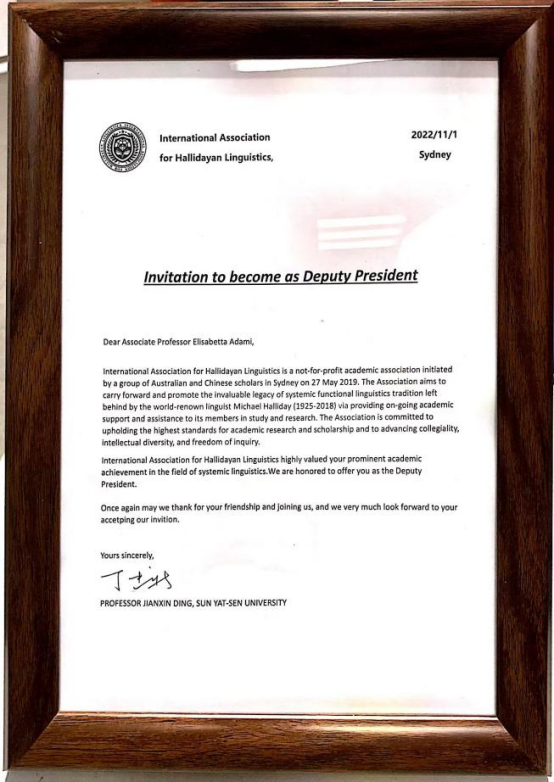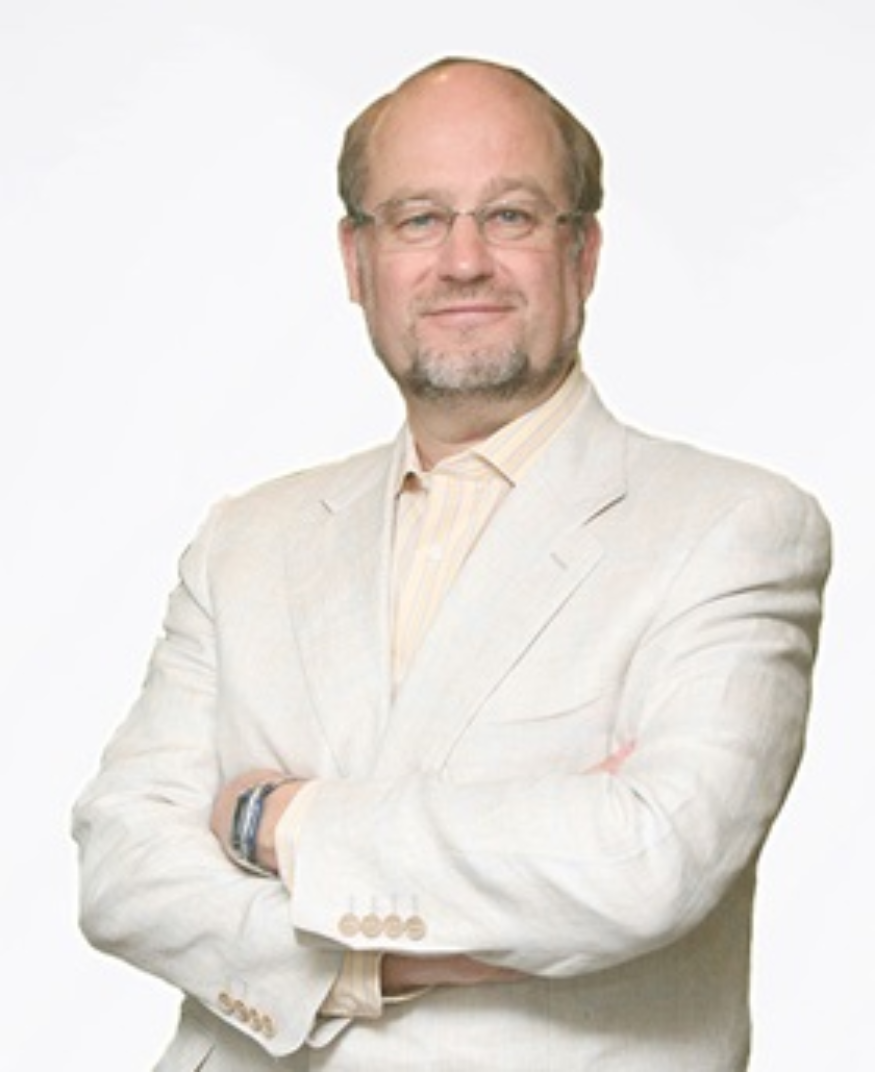Christian Matthiessen、Elisabetta Adami、Derek Irwin、Emilia Djonov
四位国际学者受聘国际韩礼德研究会名誉会长、副会长
2022年10月22-23日,国际韩礼德语言学研究会2022年会于腾讯线上顺利召开。本次会议主题是:新的意义方式——21世纪语言学的新挑战(New Ways of Meaning:Challenges to Linguistics in the 21st Century)。本次会议邀请到多位重要国际学者做主旨发言。
为更好地发扬韩礼德先生的学问与治学之道,共同推动韩礼德研究,会后中山大学丁建新教授为Christian Matthiessen教授、Elisabetta Adami副教授、Derek Irwin副教授、Emilia Djonov博士四位国际学者颁发研究会聘书,聘任Christian Matthiessen教授为国际韩礼德语言学研究会名誉会长,聘任Elisabetta Adami副教授、Derek Irwin副教授、Emilia Djonov博士为研究会副会长。Christian Matthiessen教授是国际韩礼德研究会聘请的第二位名誉会长,另外一位是北京大学胡壮麟教授。
四位学者愉快地接受了聘任。丁建新教授代表研究会对获聘的四位国际学者表示热烈祝贺,并为其介绍了研究会的历史沿革、学会宗旨以及未来构想,寄语他们在系统功能语言学领域继续做出前瞻性研究。同时丁教授强调,国际韩礼德语言学研究会十分重视国际高端学术人才的引进,非常乐于在更广的领域内广泛开展国际学术交流与合作,并期望越来越多具有国际视野的人才加入,不断壮大研究会的国际化队伍。
四位国际学者的加盟,是对国际韩礼德语言学研究会的充分肯定与支持,同样也是推动和促进研究会健康发展的重要力量,相信国际学者的加盟将为研究会的发展注入新的活力,贡献智慧和力量。




国际学者简介

Christian M.I.M. Matthiessen is Distinguished Professor, School of Foreign Languages, Hunan University. He has degrees in linguistics from Lund University (BA), where he also studied English, Arabic and philosophy, and in linguistics from UCLA (MA, PhD), and has previously held positions at USC/ Information Sciences Institute, Sydney University, Macquarie University, and the Hong Kong Polytechnic University. He has held visiting appointments at e.g. the University of Hamburg and the Brain Science Division of the RIKEN Institute in Tokyo. He is Honorary Professor, Beijing Normal University, Beijing, the Australian National University, Canberra, and Guest Professor, University of Science and Technology, Beijing.

Elisabetta Adami, PhD, is Associate Professor in Multimodal Communication at the University of Leeds, UK. Her research specialises in social semiotic multimodal analysis with a current focus on issues of culture and translation. She has published on sign-making practices in place, in digital environments, and in face-to-face interaction. She is editor of Multimodality & Society, leads Multimodality@Leeds and co-organises the Multimodality Talks seminar series.

Derek Irwin is the Chair of the International Systemic Functional Linguistic Association and an Associate Professor of Applied Linguistics at the University of Nottingham Ningbo China (UNNC). His recent work has focussed on pedagogical technologies, the movement of lexical items across languages, textual analysis of literary and dramatic texts, and approaches to literacy and language skills for post-secondary writers, particularly in terms of the grammatical resources employed in these activities. He is currently supervising PhD and EdD students working in Critical Discourse Analysis of political and literary texts, gestural and multimodal analysis in learning and in translation, discourse patterns in corpora of expert and learner texts in music, and critical thinking for the curriculum. He is one of the coordinators of arts activities at UNNC, and has worked with a number of high schools and universities internationally and in China on theatre and arts events, including training teachers on the use of drama in the EFL classroom. Derek spends his free time directing, acting, and writing fiction.

Dr Emilia Djonov is Senior Lecturer at Macquarie University, Australia. Her research interests and expertise lie in social semiotics, critical and multimodal discourse analysis, early language and literacy, and multiliteracies education. Drawing on social semiotic theory and systemic functional approaches to language and multimodality, she has examined the interaction between the design of hypermedia texts and semiotic technologies and their use. Djonov’s research has been published in journals such as Discourse, Context & Media; Discourse: Studies in the Cultural Politics of Education, Critical Discourse Studies, Visual Communication, Social Semiotics, TESOL Quarterly and Text & Talk.
CONSTITUTION
International Association for Hallidayan Linguistics
ARTICLE I: Purpose
The International Association for Hallidayan Linguistics (hereafter referred to as the Association) is a not-for-profit academic association initiated by a group of Australian and Chinese scholars in Sydney, Australia on 27 May 2019. The Association aims to carry forward and promote the invaluable legacy of systemic functional linguistics tradition left behind by the world-renown linguist Michael Halliday (1925-2018) via providing on-going academic support and assistance to its members in study and research. The Association is committed to upholding the highest standards for academic research and scholarship and to advancing collegiality, intellectual diversity, and freedom of inquiry.
ARTICLE II: Registration and Membership
The Association is an incorporated legal entity in Australia governed by the law, by-law and regulations of Australia. In line with the requirements of the Australian Government, the Association submits annual report and related documents for review by the governing agency of the Australian Government.
Membership system is implemented in the Association and is open to scholars of all disciplines world-wide who are at any stage of their careers. Interested individuals or organizations in various parts of the world are required to submit an application to the Association before becoming a full member of the Association upon approval by the Association.
Members of the Association must abide by the Constitution of the Association and take an active part in the academic as well as cultural events and activities organized by the Association.
ARTICLE III: The Association Committee
Section 1: Composition
The Association Committee (hereafter referred to as the Association Committee) is comprised of Honorary President, President, Deputy President(s), Secretary General, Executive Council Members and Council Members from different parts of the world. The Association Committee has the discretion to decide on the new members of the Association Committee and currently no limit is set on the maximum number of Association Committee members.
All members of the Association Committee shall actively participate in the events and activities organized by the Association. A Committee member who is absent from all such events and activities for a consecutive three years shall be deemed to be waiving his or her obligations and rights as a Committee Member and herein will be removed from the Association Committee but will remain as a full member of the Association.
Section 2: Meetings
All meetings of the Association Committee shall be convened by the President or by a member of the Association Committee whom the President designated. Advance notice of dates and venues of the meetings should be given to all Association Committee members.
Section 3: Quorum
A quorum for Association Committee meetings shall be four members. The Secretary General shall keep minutes of meetings and records of attendance.
Section 4: Powers
The Association Committee is authorized to act on behalf of the members to formulate policies and procedures for the Association. It may accept proposals from Association Committee members, the general membership, the Executive Committee and decide on the course of actions.
Section 5: Indemnity
All officers of the Association shall be indemnified by the Association for any expenses incurred in executing their duties on behalf of, and on the direction of, the Association Committee.
ARTICLE IV: General Meetings
Section 1: Annual General Meeting
The Annual General Meeting of the Association shall be held each year. Advance notice in writing must be given to all member at least 10 days prior to the meeting.
All members of the Association may submit motions for discussions at the AGM. Such motions must be received by the Secretary General not later than 7 days prior to the meeting.
Section 2: Special General Meeting
A Special General Meeting may be called by the committee or by requisition signed by not less than half of the full members of the Association, delivered to the Secretary General, who in turn must call such a meeting within two weeks from the date or receipt of such requisition. Only the matters stated in the requisition may be debated at the Special General Meeting, and details of the said business should be included in the notice of meeting sent to all members.
ARTICLE V:Financial Statement and Auditing
The account of the Association shall be closed for audit purposes on the 15 June in each year.
An independent accountant shall be appointed by the Association Committee to prepare or audit the annual summary of financial affairs (Form A12).
ARTICLE VI: Interpretation
The Association Committee shall have full power to decide any question for which no provision is made for in these rules, and shall be responsible for proposing the appropriate amendment at the earliest possible time.
ARTICLE VII: Dissolution
The Association may be dissolved only by the vote of not less than 60% present at a Special General Meeting called for that purpose. An audited financial report shall be presented at such a meeting. The dissolution will not be effected until assets are disposed of and liabilities discharged. In the event of insufficient funds to clear liabilities, the existing members shall contribute the deficiency, in equal shares.